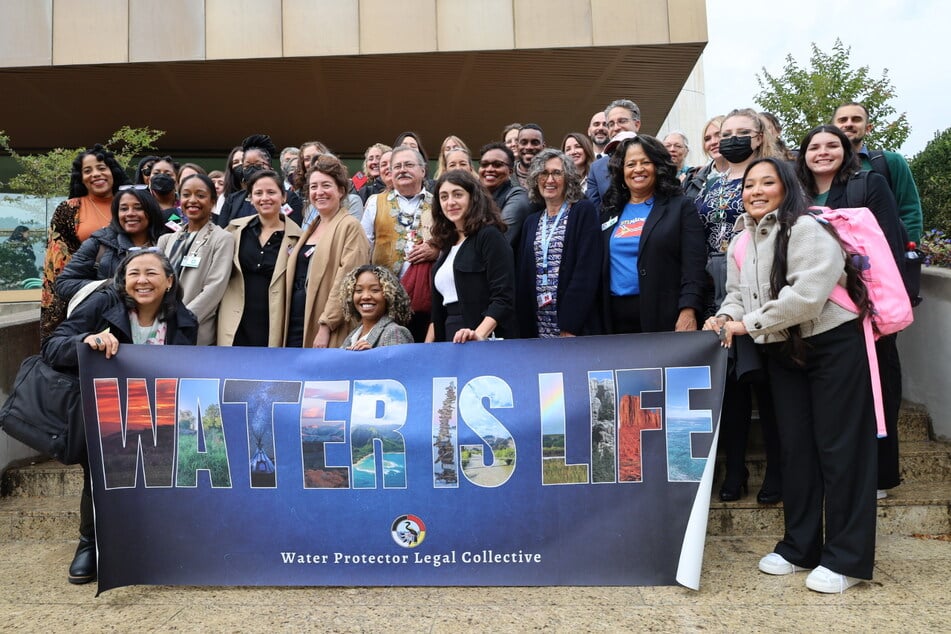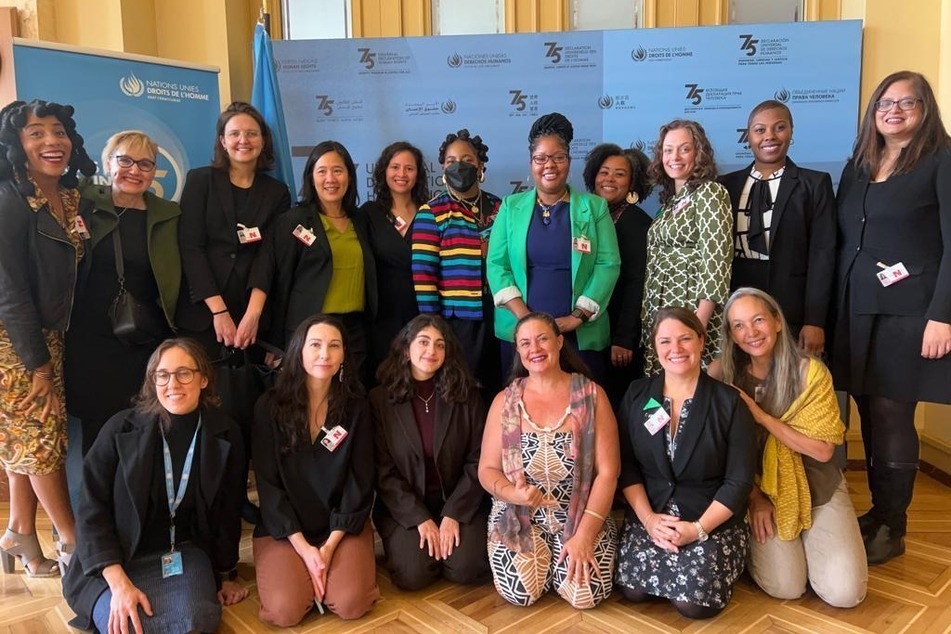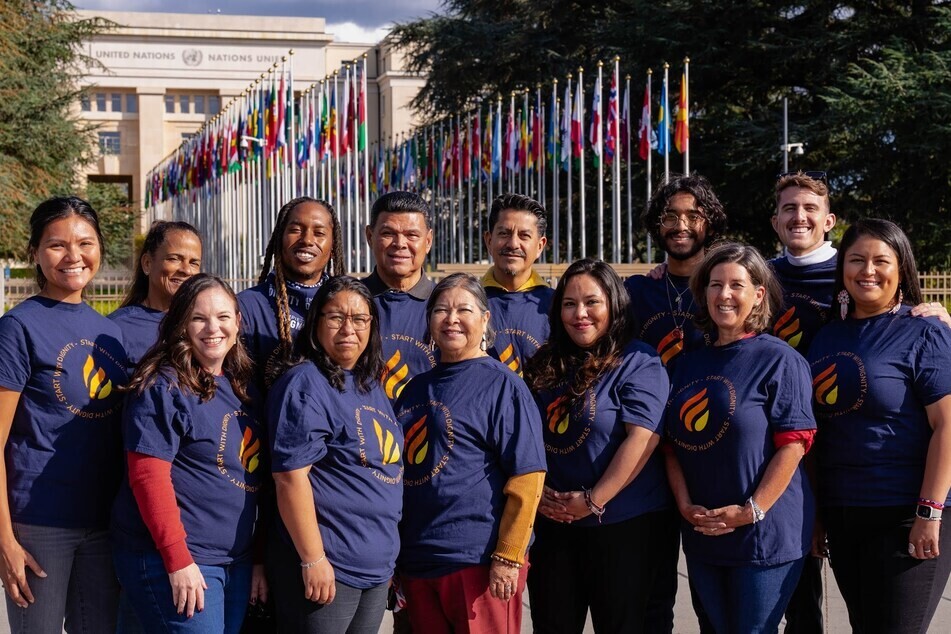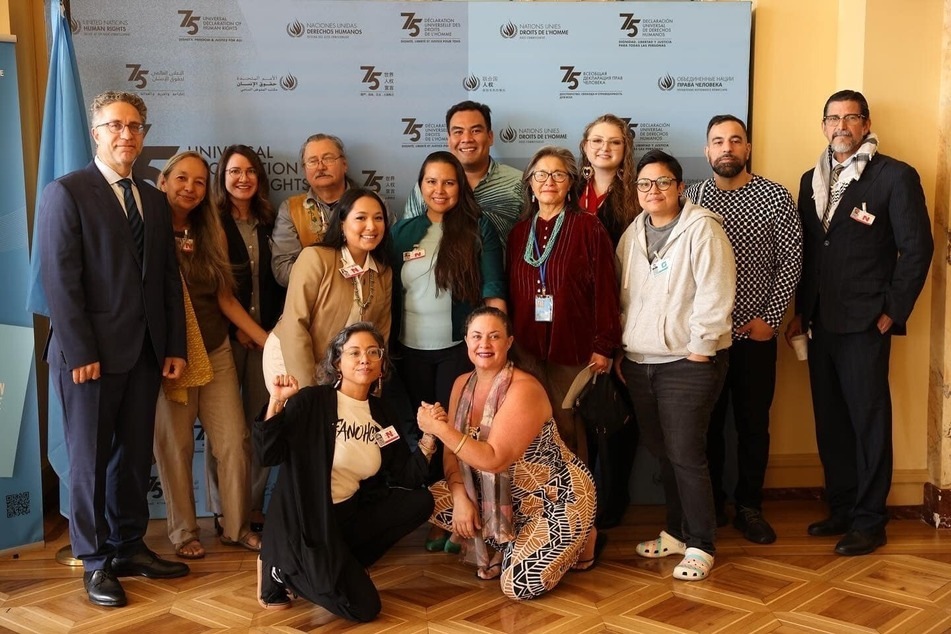UN Human Rights Committee releases recommendations to address sweeping US violations
Geneva, Switzerland - The United Nations Human Rights Committee on Friday released its recommendations for the US, revealing a pattern of routine and systemic violations.
- Expanding voting rights
- Guaranteeing access to reproductive health care
- Ending racial profiling and protecting immigrants' rights
- Ending mass incarceration and life without parole
- Strengthening protections for Indigenous Peoples
- Ending the gun violence epidemic
- Ensuring LGBTQ+ and gender equality
- Ending the criminalization of homelessness
- Addressing the climate emergency
- Creating a national human rights institution

Last month, more than 100 social and racial justice advocates traveled across the ocean to Geneva, Switzerland, to testify on the US' failure to meet its international human rights obligations.
The UN Human Rights Committee heard from those advocates and from a delegation of US officials in order to monitor the country's compliance with the International Covenant on Civil and Political Rights (ICCPR). It was the first time the process had happened in nine years.
During its two-day review, committee members posed questions to Biden administration officials on topics ranging from treatment of people detained at Guantanamo Bay to extreme sentencing practices, Indigenous water rights, militarization of Southern border communities, access to reproductive health care, and other top priorities.
Activists and advocates felt the US delegation's engagement in the process left a lot to be desired. In a powerful moment, many stood up and turned their backs on government officials in silent protest as Ambassador Michèle Taylor made her final remarks to the committee.
Even though they did not get the responses they wanted from the US government, advocates expressed hope that their concerns would be reflected in the committee's concluding observations, released on November 3.
Here are some of the UN Human Rights Committee's top recommendations for the US after its 2023 review.
Expanding voting rights
The UN Human Rights Committee's 17-page report includes numerous recommendations to address sweeping human rights crises across the US and its territories, including at the ballot box.
To combat the recent slew of discriminatory voter suppression laws, the committee recommended:
- broadening access to polling stations
- passing the John R. Lewis Voting Rights Advancement Act and the Freedom to Vote Act
- ending partisan gerrymandering
- increasing protections for election officials
- reinstating voting rights for people previously convicted on felony charges
The committee also called on the US to rein in the use of dark money and boost transparency in elections through passage of the Democracy is Strengthened by Casting Light on Spending in Elections (DISCLOSE) Act.
Guaranteeing access to reproductive health care

Access to reproductive health care was another central theme in the 2023 review, with the UN Human Rights Committee pushing the US government to fight back against states' restrictive abortion bans and end discriminatory barriers to midwifery care.
In particular, the committee recommended:
- guaranteeing the federal right to an abortion via the Women's Health Protection Act
- expanding access to medication abortion
- ending criminalization and strengthening privacy protections for patients and providers
"Today is a reckoning for United States policymakers at every level of government," Bethany Van Kampen Saravia, senior legal and policy advisor at Ipas, said in a statement upon the recommendations' release. "The United Nations Human Rights Committee has appropriately called on the US government to acknowledge the human rights crisis that is taking place within America, as states continue to ban abortion and limit access to sexual and reproductive health care."
"The US government has long held itself as a beacon of human rights, but the reality is far from it and the truth is finally coming to light. In the past twenty years, nearly 40 countries have liberalized their abortion laws, while only four have regressed and the US is one of them," she continued.
"The US is going against the global trend and now we must do something about it."
Ending racial profiling and protecting immigrants' rights

Ending racial profiling and protecting immigrants' rights were additional priorities during the review.
The committee ultimately urged the US government:
- to pass the End Racial and Religious Profiling Act and the George Floyd Justice in Policing Act
- to investigate and prosecute all allegations of racial profiling
- provide effective remedies to the victims
- to collect comprehensive data on incidents and complaints of racial profiling by law enforcement, including Customs and Border Protection and Immigration and Customs Enforcement officers
On top of that, the committee said the US should do a comprehensive review of its immigration and border policy and strengthen protections for migrants and asylum seekers by ensuring access to legal aid, language interpretation, and safe living conditions.
The committee noted that detention of migrants should only be a short-term, last-resort measure and encouraged the US to explore alternatives to surveillance-based technology at the border, which may violate the ICCPR's right to privacy.
The recommendations came after a delegation of activists traveled to Geneva to testify on militarization of borderlands communities and systematic human rights violations by federal, state, and local law enforcement officers.
Ending mass incarceration and life without parole
The UN Human Rights Committee expressed concern over the overrepresentation of Black, Indigenous, and Latino people in jails, prisons, and detention centers across the US.
To address these grave injustices, the committee recommended the US pursue alternatives to detention, the cash bail system, and mandatory minimum sentencing. It also urged an end to the use of solitary confinement for juveniles and disabled persons.
The committee additionally also called not only for a nationwide moratorium on executions but also for life without parole (LWOP) sentences, often referred to as death by incarceration or "the other death penalty."
The inclusion of LWOP marked a huge win for abolitionists who made the trip to Geneva to share personal testimonies of surviving death-by-incarceration sentences.
Strengthening protections for Indigenous Peoples

Regarding Indigenous rights, the UN Human Rights Committee expressed concerns over obstacles to the recognition of Indigenous Peoples as well as threats posed to Indigenous lands and sacred sites from extractive industries, US military infrastructure, and toxic and nuclear waste.
The committee urged greater protections for lands and sacred sites plus more effective measures to honor treaty rights and secure free, prior, and informed consent before engaging in development or infrastructure projects.
The US was also called upon to do more to address the crisis of missing and murdered Indigenous women, including by improving data collection and ensuring thorough investigations, prosecutions, and punishments, as well as effective remedies for survivors and their families.
Indigenous leaders and advocates at the UN testified on the urgent need to trigger decolonization processes in illegally occupied Alaska and Hawaii, as well as in the territories of Guam and Puerto Rico.
However, calls for decolonization were not reflected in the committee's recommendations.
Ending the gun violence epidemic
The wave of gun violence sweeping US communities was another central issue for the UN Human Rights Committee.
Their concluding report called on the federal government to:
- require universal background checks for firearm and ammo purchases
- ban assault weapons and high-capacity magazines
- restrict firearm possession for people under domestic violence restraining orders
- ensure that gun industry entities may be held accountable in cases of firearm abuse
A failure to take effective action could violate the ICCPR's right to life guarantee, the committee warned.
Ensuring LGBTQ+ and gender equality
The UN Human Rights Committee also called on the Biden administration to do more to guarantee constitutional protections against sex and gender-based discrimination, including through publication of the Equal Rights Amendment.
The US should also enact comprehensive protections against LGBTQ+ discrimination and expand access to housing, health care, and employment.
Any instances of discrimination, harassment, and violence should be thoroughly investigated and punished, and victims should have effective channels to seek redress.
Ending the criminalization of homelessness
Laws and policies that seek to punish unhoused people are another area in need of improvement, with the US urged to abolish policies that criminalize homelessness and withdraw federal funding from states and localities that do so.
The US was also encouraged to pass laws that protect the rights of unhoused people and reallocate funding for law enforcement responses to housing and shelter programs.
Addressing the climate emergency
When it comes to the rapidly heating planet, the UN Human Rights Committee noted that the US has so far failed to take comprehensive and effective steps to protect the most vulnerable to the impacts of climate change and natural disasters.
In accordance with the ICCPR's right to life guarantee, the committee called on the US to strengthen its legal framework and take measures to combat environmental racism, including by ensuring access to safe and clean water for all.
Creating a national human rights institution
The UN Human Rights Committee expressed grave concerns over the incorporation of ICCPR rights in the US' domestic legal framework – a necessary step to facilitate the enactment of its recommendations.
That's why the committee said the US government should establish an independent national human rights institution to monitor implementation of the covenant at the federal, state, local, and territorial levels.
The committee's recommendations are non-binding. Nevertheless, advocates believe they will provide an important boost to their work, showing that human rights are not only a matter of domestic policy but also of international law.
Cover photo: Kaitlyn Kennedy

